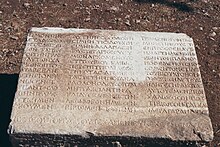
Epicurus was an ancient Greek philosopher and sage who founded Epicureanism, a highly influential school of philosophy. He was born on the Greek island of Samos to Athenian parents. Influenced by Democritus, Aristippus, Pyrrho, and possibly the Cynics, he turned against the Platonism of his day and established his own school, known as "the Garden", in Athens. Epicurus and his followers were known for eating simple meals and discussing a wide range of philosophical subjects. He openly allowed women and slaves to join the school as a matter of policy. Of the over 300 works said to have been written by Epicurus about various subjects, the vast majority have been lost. Only three letters written by him—the letters to Menoeceus, Pythocles, and Herodotus—and two collections of quotes—the Principal Doctrines and the Vatican Sayings—have survived intact, along with a few fragments of his other writings. As a result of his work's destruction, most knowledge about his philosophy is due to later authors, particularly the biographer Diogenes Laërtius, the Epicurean Roman poet Lucretius and the Epicurean philosopher Philodemus, as well as the hostile but largely accurate accounts by the Pyrrhonist philosopher Sextus Empiricus, and the Academic Skeptic and statesman Cicero.

Adeline Virginia Woolf was an English writer. She is considered one of the most important modernist 20th-century authors. She pioneered the use of stream of consciousness as a narrative device.

Titus Lucretius Carus was a Roman poet and philosopher. His only known work is the philosophical poem De rerum natura, a didactic work about the tenets and philosophy of Epicureanism, which usually is translated into English as On the Nature of Things—and somewhat less often as On the Nature of the Universe. Very little is known about Lucretius's life; the only certainty is that he was either a friend or client of Gaius Memmius, to whom the poem was addressed and dedicated. De rerum natura was a considerable influence on the Augustan poets, particularly Virgil and Horace. The work was almost lost during the Middle Ages, but was rediscovered in 1417 in a monastery in Germany by Poggio Bracciolini and it played an important role both in the development of atomism and the efforts of various figures of the Enlightenment era to construct a new Christian humanism.

Epicureanism is a system of philosophy founded 307 BCE based upon the teachings of Epicurus, an ancient Greek philosopher. Epicurus was an atomist and materialist, following in the steps of Democritus. His materialism led him to religious skepticism and a general attack on superstition and divine intervention. Epicureanism was originally a challenge to Platonism, and its main opponent later became Stoicism. It is a form of hedonism insofar as it declares pleasure to be its sole intrinsic goal. However, the concept that the absence of pain and fear constitutes the greatest pleasure, and its advocacy of a simple life, make it very different from hedonism as colloquially understood.

The Bloomsbury Group was a group of associated British writers, intellectuals, philosophers and artists in the early 20th century. Among the people involved in the group were Virginia Woolf, John Maynard Keynes, E. M. Forster, Vanessa Bell, and Lytton Strachey. Their works and outlook deeply influenced literature, aesthetics, criticism, and economics, as well as modern attitudes towards feminism, pacifism, and sexuality.

Vanessa Bell was an English painter and interior designer, a member of the Bloomsbury Group and the sister of Virginia Woolf.
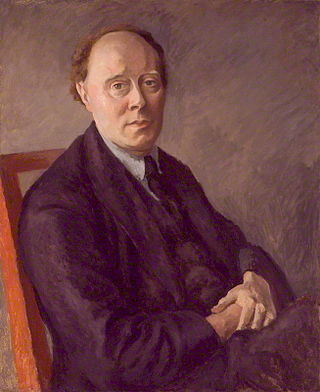
Arthur Clive Heward Bell was an English art critic, associated with formalism and the Bloomsbury Group. He developed the art theory known as significant form.

Roger Eliot Fry was an English painter and critic, and a member of the Bloomsbury Group. Establishing his reputation as a scholar of the Old Masters, he became an advocate of more recent developments in French painting, to which he gave the name Post-Impressionism. He was the first figure to raise public awareness of modern art in Britain, and emphasised the formal properties of paintings over the "associated ideas" conjured in the viewer by their representational content. He was described by the art historian Kenneth Clark as "incomparably the greatest influence on taste since Ruskin ... In so far as taste can be changed by one man, it was changed by Roger Fry". The taste Fry influenced was primarily that of the Anglophone world, and his success lay largely in alerting an educated public to a compelling version of recent artistic developments of the Parisian avant-garde.

De rerum natura is a first-century BC didactic poem by the Roman poet and philosopher Lucretius with the goal of explaining Epicurean philosophy to a Roman audience. The poem, written in some 7,400 dactylic hexameters, is divided into six untitled books, and explores Epicurean physics through poetic language and metaphors. Namely, Lucretius explores the principles of atomism; the nature of the mind and soul; explanations of sensation and thought; the development of the world and its phenomena; and explains a variety of celestial and terrestrial phenomena. The universe described in the poem operates according to these physical principles, guided by fortuna ("chance"), and not the divine intervention of the traditional Roman deities.
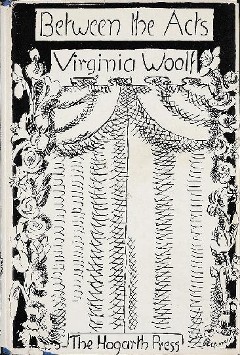
Between the Acts is the final novel by Virginia Woolf. It was published shortly after her death in 1941. Although the manuscript had been completed, Woolf had yet to make final revisions.
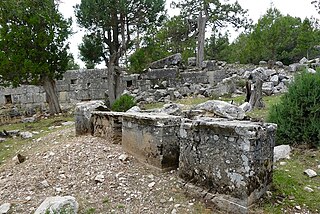
Diogenes of Oenoanda was an Epicurean Greek from the 2nd century AD who carved a summary of the philosophy of Epicurus onto a portico wall in the ancient Greek city of Oenoanda in Lycia. The surviving fragments of the wall, originally extended about 80 meters, form an important source of Epicurean philosophy. The inscription, written in Greek, sets out Epicurus' teachings on physics, epistemology, and ethics. It was originally about 25,000 words long and filled 260 square meters of wall space. Less than a third of it has been recovered.
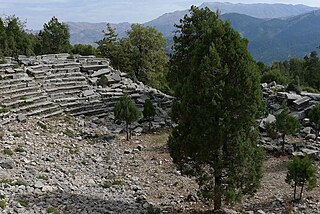
Oenoanda was a Lycian city, in the upper valley of the River Xanthus. It is noted for the philosophical inscription by the Epicurean, Diogenes of Oenoanda.
David Neil Sedley FBA is a British philosopher and historian of philosophy. He was the seventh Laurence Professor of Ancient Philosophy at Cambridge University.
Frances Spalding is a British art historian, writer and a former editor of The Burlington Magazine.
Don Paul Fowler was an English classicist.
Alison Ruth Sharrock is an English Classics scholar. She has been Professor of Classics at the University of Manchester since August 2000. In 2009, she gave the Stanford Memorial Lectures. Together with David Konstan of Brown University, she edits the series Oxford Studies in Classical Literature and Gender Theory published by Oxford University Press.

Freshwater: A comedy is a play written and produced by Virginia Woolf in 1935, and the only play she wrote. Although only performed once in her lifetime, it has been translated into many languages and produced in many countries since. Alfred Lord Tennyson appears as a character in this play.

Mary Louisa Gordon was a British physician, prison inspector and writer. After graduating from the London School of Medicine for Women in 1890, Gordon worked at the East London Hospital for Children, the Evelina London Children's Hospital, and later had a private practice in Harley Street. While working as a physician, she made a number of public addresses and wrote publications on topics including the effects of prostitution and alcohol dependence on women.

Lalla Vandervelde (1870–1965), was a British-Belgian socialite and patron of the arts. She was married to Émile Vandervelde, the former minister d'etat of Belgium, and had close relationships with several influential artists and writers of the early twentieth century, including Roger Fry.

Helen Coombe (1864–1937), known after her 1896 marriage to Roger Fry as Helen Fry, was a British artist. She was a painter and a decorative artist in the Arts & Crafts style.

